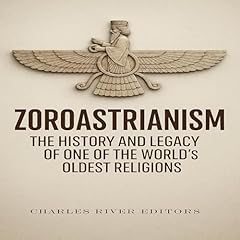
The French Mandate for Syria and the Lebanon: The History and Legacy of France's Administration of the Levant after World War I
Impossible d'ajouter des articles
Échec de l’élimination de la liste d'envies.
Impossible de suivre le podcast
Impossible de ne plus suivre le podcast
3 mois pour 0,99 €/mois
Acheter pour 6,24 €
-
Lu par :
-
Colin Fluxman
À propos de ce contenu audio
The United Nations is one of the most famous bodies in the world, and its predecessor, the League of Nations, might be equally notorious. In fact, President Woodrow Wilson’s pet project was controversial from nearly the minute it was conceived. At the end of World War I, Wilson's pleas at the Paris Peace Conference relied on his Fourteen Points, which included the establishment of a League of Nations, but while his points were mostly popular amongst Americans and Europeans alike, leaders at the Peace Conference largely discarded them and favored different approaches. British leaders saw their singular aim as the maintenance of British colonial possessions. France, meanwhile, only wanted to ensure that Germany was weakened and unable to wage war again - and it, too, had colonial interests abroad that it hoped to maintain. Britain and France thus saw eye-to-eye, with both wanting a weaker Germany and both wanting to maintain their colonies.
Although the League of Nations was short-lived and clearly failed in its primary mission, it did essentially spawn the United Nations at the end of World War II, and many of the UN’s structures and organizations came straight from its predecessor, with the concepts of an International Court and a General Assembly coming straight from the League. More importantly, the failures of the League ensured that the UN was given stronger authority and enforcement mechanisms, most notably through the latter’s Security Council, and while the League dissolved after a generation, the UN has survived for over 70 years.
One of the League’s most lasting legacies was the manner in which it handed over administrative control of land in the Middle East to the victorious Allied Powers, namely France and Britain. The Ottoman Empire quickly collapsed after World War I, and its extensive lands were divvied up between the French and British. While the French gained control of the Levant, which would later become modern day nations like Syria and Lebanon, the British were given the Mandate for Palestine. The British Mandate for Palestine gave the British control over the lands that have since become Jordan, Israel, the West Bank, and the Gaza Strip.
The intention of the mandate system was to have the administrators peacefully and gradually usher in independent states, and both European powers eventually attempted to withdraw from the region, but anyone with passing knowledge of the Middle East’s history in the late 20th century knows that the region has seen little peace. As with the British Mandate of Palestine, the French found themselves attempting to placate various ethnicities that they only had a passing familiarity with, and the lines they drew for states like Syria and Lebanon were ultimately arbitrary. The French would completely evacuate the region in the wake of World War II, but the ramifications are still being felt today....
©2019 Charles River Editors (P)2019 Charles River Editors
Vous êtes membre Amazon Prime ?
Bénéficiez automatiquement de 2 livres audio offerts.Bonne écoute !
























